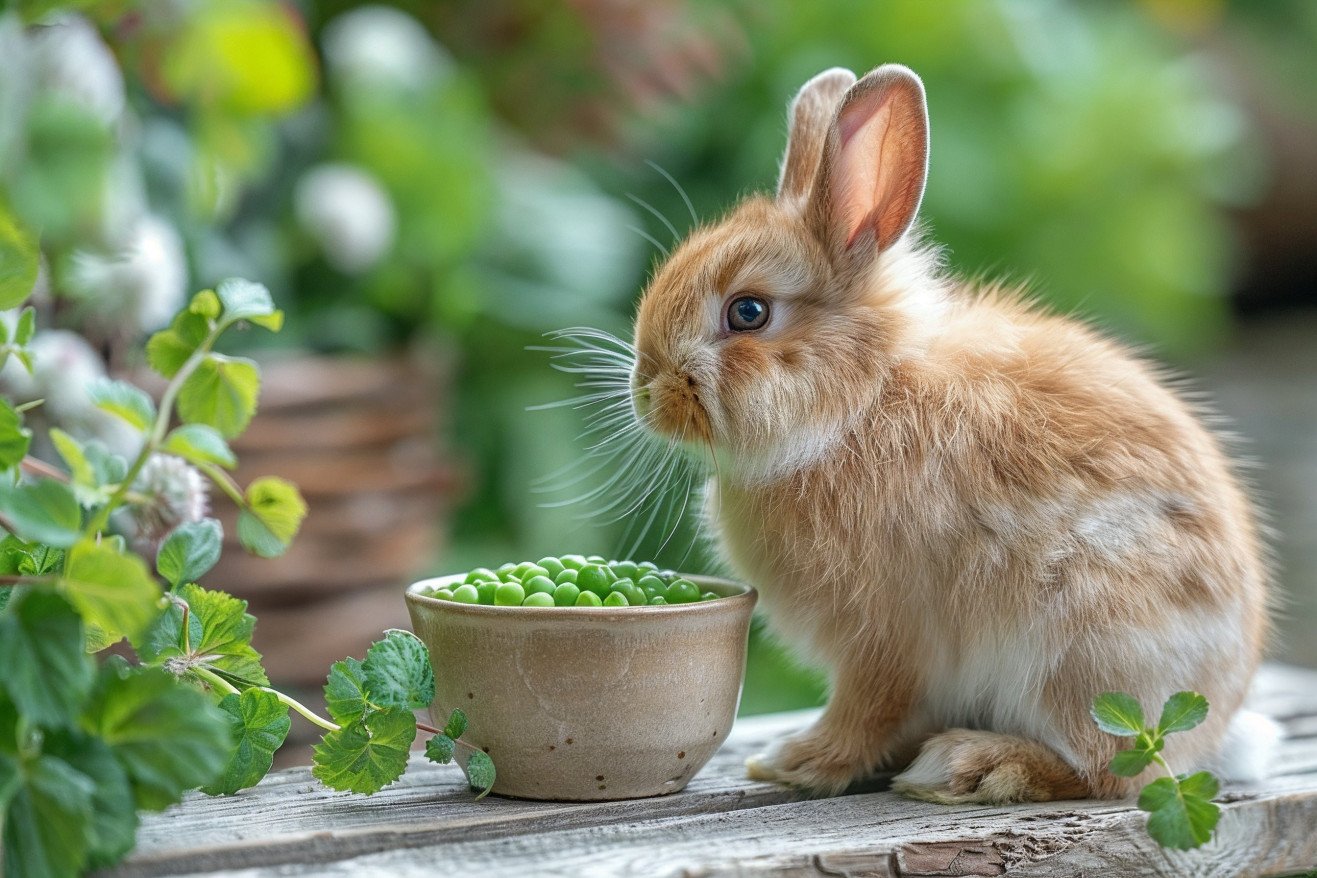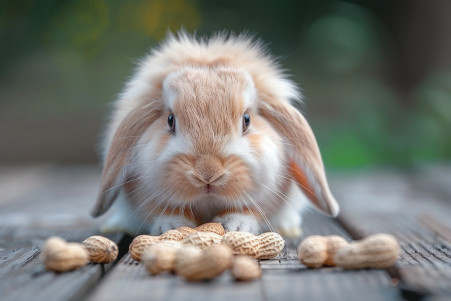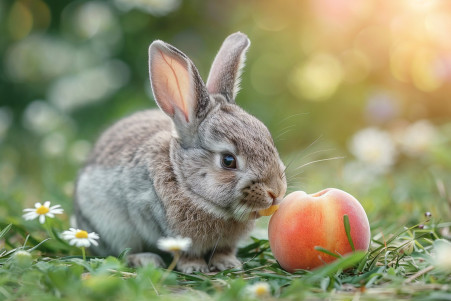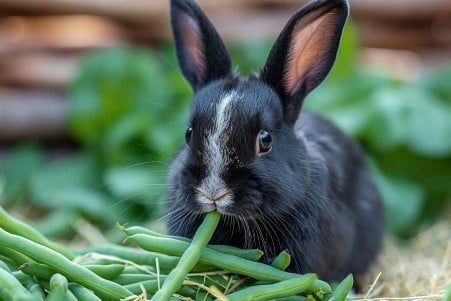Can Rabbits Eat Peas? Exploring the Benefits and Risks
1 June 2024 • Updated 31 May 2024

If you’ve ever looked at your garden and wondered if your rabbit could help you out with some of the excess peas, you’ve probably also wondered if it’s safe for your rabbit to eat them. After all, you want to make sure that you’re keeping your pet safe and healthy. The good news is that peas are safe for rabbits to eat, but there are some caveats.
Peas can be a healthy addition to your rabbit’s diet, but they should be fed in moderation and as part of a well-rounded meal plan. They have a number of nutritional benefits, including fiber, vitamins, and proteins, but they can also cause some health problems if they’re not fed correctly.
In this article, we’ll take a look at what veterinarians and other rabbit experts have to say about the nutritional value of peas for rabbits and how to feed them to your pet safely. This way, you’ll be able to make sure that you’re keeping your rabbit healthy while still allowing them to enjoy a tasty treat. Once you know the facts, you can decide whether or not to add this popular garden vegetable to your rabbit’s diet.
Can rabbits eat peas?
Nutritional Benefits of Peas for Rabbits
Peas can be a healthy treat that offers a number of benefits for rabbits when given in moderation as part of a well-rounded diet. For one, they are high in fiber, which is important for keeping the rabbit's digestive system healthy. In addition, Rabbit.org notes that peas are a good source of vitamins C and K and protein.
Peas are also low in calories and fat, which means they can be given as an occasional treat without leading to obesity in rabbits. Fresh or frozen peas are preferred over canned peas, which can have added salt and preservatives that are unhealthy for rabbits.
When part of a well-rounded diet that includes hay and other fresh veggies, peas can offer important nutrients like vitamin A, vitamin C, potassium and iron that can help rabbits stay healthy. In addition, the high water content of peas can help rabbits stay hydrated. That said, it's important not to overdo it, as peas should not be the main part of a rabbit's diet. That said, given their nutritional content and the fact that rabbits tend to like them, peas can be a good way to mix things up.
How to Add Peas to Your Rabbit's Diet: Tips and Tricks
As with any new food, when adding peas to your rabbit's diet, it's important to start slow to avoid digestive issues. Ohio Holland Lops notes that you should be especially careful with the treats you give your bunny because many pet rabbits have sensitive stomachs.
You can start by giving your rabbit a small portion of peas, like a few peas or a tablespoon, and see how they react. RabbitsAdvisor.com suggests that you can then increase the amount over the course of a few days or weeks to give your rabbit's stomach time to get used to the new food. If you notice any signs of digestive distress, like diarrhea, soft stools, or a lack of appetite, you can adjust the portion size from there.
In addition, make sure to offer your rabbit fresh water and hay to help support their digestive health as they get used to the new food, as noted by SaveAFluff.co.uk. With a little patience and a watchful eye, you can make sure that your rabbit can safely enjoy peas as an occasional treat.
Feeding Rabbits Peas: How to Prepare and Serve
If you're going to feed your rabbit peas, it's important to prepare them in a way that makes them safe and easy to eat. First, make sure to wash the peas to remove any dirt, pesticides, or other harmful substances before giving them to your rabbit. Central Victoria Hay notes that if you're feeding your rabbit snow peas or sugar snap peas, you'll also need to remove the strings or stems, which can be hard for rabbits to digest.
To avoid a choking hazard, Berry Patch Farms suggests that you cut larger peas or pea pods into smaller pieces that are easier for rabbits to eat. The general serving size for peas is about 1/10 cup per day for a medium-sized rabbit, although this can vary depending on the rabbit's size and other dietary requirements, according to SaveAFluff.co.uk.
To make sure your rabbit is getting a well-rounded diet, you'll want to mix peas in with other vegetables and greens. This will help ensure that your rabbit gets all of the nutrients they need to stay healthy.
Potential Dangers and Digestive Problems of Overfeeding Peas
While peas can be a healthy, occasional snack for rabbits, overconsumption can lead to severe digestive issues, including gastrointestinal (GI) stasis. According to PetMD, GI stasis is when a rabbit's digestive system slows down or stops, causing a painful buildup of gas and bloating.
Diets that are high in carbohydrates and low in fiber can lead to an imbalance in a rabbit's cecal microflora, which can lead to GI stasis. As noted by VCA Animal Hospitals, this change in pH in the cecum leads to an overgrowth of gas-producing bacteria, which can produce toxins that can cause organ failure.
Signs of GI stasis include a decreased or complete lack of appetite, a decrease or lack of fecal output, lethargy, and abdominal pain. The research in PMC shows that this imbalance in cecal microflora and motility can cause pain, stress, and a further decrease in appetite, which can lead to a vicious cycle. If a rabbit shows these symptoms after eating an excessive amount of peas, it's important to get them to a vet immediately, as GI stasis can be fatal.
How to Create a Well-Balanced Rabbit Diet That Includes Peas
While peas can be a good source of vitamins and minerals, they should only be a small part of your rabbit's diet. The RSPCA notes that a well-balanced rabbit diet should be made up mostly of high-quality hay, which is an important source of fiber and other nutrients.
In addition to hay, rabbits should be fed a variety of fresh leafy greens and vegetables, including romaine lettuce, carrots, and broccoli. The Educated Rabbit suggests that you rotate the different vegetables you feed your rabbit to ensure they get a variety of nutrients and to prevent digestive issues that can arise from feeding them too much of one type of vegetable.
The Rabbit Haven notes that you should work with a vet or rabbit-savvy person to determine the right balance and variety of vegetables for your rabbit. However, by making sure that peas are just one part of a well-balanced diet, you can be sure that your rabbit is getting everything they need to be healthy and well.
Conclusion: Feed Peas in Moderation for a Healthy, Happy Bunny
Although peas can be a nutritious and safe treat, they should not be a staple in your rabbit's diet. Instead, a rabbit's diet should be based on high-quality hay, which provides the fiber and nutrients that rabbits need. In addition to hay, rabbits should be fed a variety of fresh vegetables and leafy greens, including romaine lettuce, carrots, and broccoli.
By rotating the vegetables that you feed your rabbit, you can ensure that they get a variety of nutrients and avoid overfeeding them any one type of vegetable. As noted by The Rabbit Haven, it's important to work with a vet or rabbit-savvy individual to make sure that you're feeding your rabbit the right mix and amount of vegetables. By making sure that peas are just one part of a well-rounded diet, you can make sure that your rabbit gets all the nutrients that they need to be healthy and happy.


